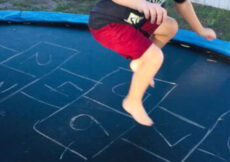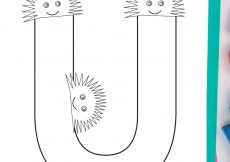In France we celebrate Halloween very little. Since 2000 this celebration of the cult of the dead has spread in a rather commercial way. I’ve never really bought into the celebration of Halloween, a party that may be considered creepy and morbid. On the other hand, I am much more attracted by the feast of the dead in Latin countries such as Spain or Mexico. I also find the idea of the meal at the cemetery interesting.
I am always amazed by my children, who despite having known several deaths, are still fascinated by Halloween and its almost “gothic” clichés.
Usually we watch a movie like Coco or Tim Burton’s Corpse Bride for Halloween, while eating a pizza on a table lit up with pumpkins and lanterns. This year I agreed to go around the shops in our city with my youngest son. He was really happy to be able to collect candies for the first time and show off his disguise.
But beyond appearances, Halloween (or the cult of the dead once a year) is necessary and has some significant psychological benefits…
First let us remember that for many parents and families death is a taboo. We avoid telling children who died or how. We try to preserve the little ones from this dimension of life, because it is one! Everyone will know the death of a close being, one day, before considering his own! Halloween lifts the taboo. On this day it is possible for children to question death rather than listen through doors!
Then Halloween raises the dead! It’s a way of giving back their place to our deceased in a rather burlesque way, it’s true, but it’s still recognizing the place of the deceased in the life of the living. It goes beyond the simple memory or the simple evocation, it is really an opportunity to speak again of the people who have left on the other side of the veil.
For me, who totally believes in the survival of conscience (I speak of conscience and not of soul…) Halloween is a way of making the little ones understand that death is not the end. For someone to disappear completely, we should no longer think about them at all, no longer evoke their image and name and integrate the fact that we are certain that there will be nothing after life! Halloween gives everyone hope that there is something else after death!
I also find the people who give sweets fascinating because they show that on certain days there can be sharing and solidarity. I also find it fascinating people who decide not to give anything and not to participate because they have the courage to face hordes of crazy kids! But above all, their refusal to give teaches our children that life is like this: sometimes we receive, others we don’t! I’m also amazed at how my little boy handled the rejections like a pro, without drama or discouragement!
Going around the shops and ringing the doorbell with him was a highlight for me because it was above all a “work” done in pairs. So it was only natural for him to share the candies with me! It’s usually a difficult posture to get from him.
Finally confronting zombies and the vision of death allows the little ones to master something that still scares them. Scaring themselves is a way to control their fears about death.
I also think it’s fine to be able to talk excessively about death and the deceased on Halloween. If everything is done well on that day, the rest of the year can belong to the only living! Celebrating Halloween is a way of doing the small daily mourning (regrets, nostalgia, guilt…) and then starting off on the right foot!


































